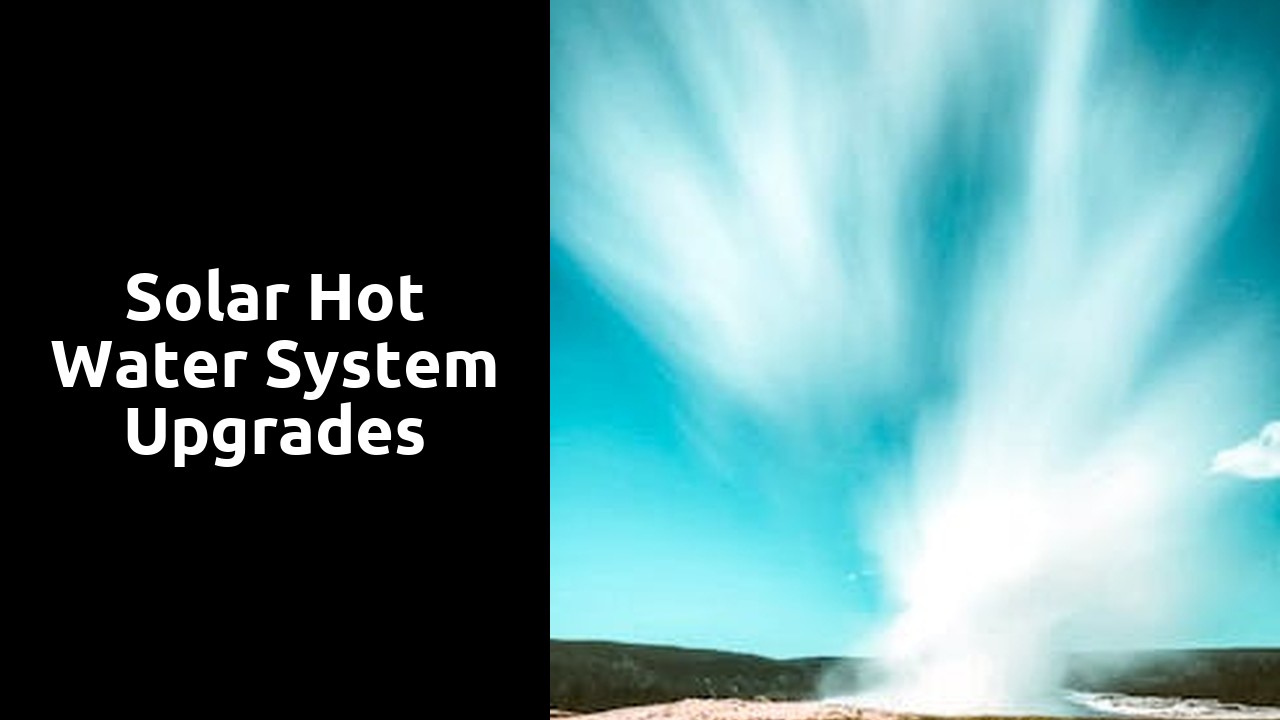
Environmental Impact of Using Solar Hot Water
Switching to solar hot water systems can significantly reduce the carbon footprint of households in Queensland. By harnessing the sun's energy to heat water, these systems decrease the reliance on electricity generated from fossil fuels, thus cutting down greenhouse gas emissions. This shift towards renewable energy sources aligns with the Australian government's targets to promote sustainable practices and combat climate change. In addition to the direct environmental benefits, Solar Hot Water System Upgrades can also lead to long-term cost savings for homeowners, making it a practical and eco-conscious investment.
Furthermore, the implementation of solar hot water systems can help alleviate the strain on the traditional energy grid during peak usage periods. By reducing the demand for electricity to heat water, households can contribute to a more stable and reliable grid infrastructure. This decreased dependence on traditional energy sources not only lessens the environmental impact but also enhances the overall efficiency of the energy network. As more homeowners embrace solar technology, the collective effort towards sustainable energy practices grows stronger, paving the way for a cleaner and greener future for Queensland.
Contributing to a Sustainable Future
Solar hot water systems have been hailed as a key player in contributing to a sustainable future in Queensland. By encouraging the adoption of solar hot water systems, the state government is taking significant steps towards reducing greenhouse gas emissions and dependency on non-renewable energy sources. Solar hot water systems are efficient alternatives that harness the sun's energy to provide hot water, thus reducing the reliance on fossil fuels and minimizing the carbon footprint of households and businesses. Through the implementation of incentives such as rebates and financial support for Solar Hot Water System Upgrades, Queensland is promoting a greener and more sustainable approach to energy consumption.
These initiatives not only benefit the environment but also pave the way for a more economically sustainable future. By promoting the adoption of solar hot water systems, Queensland is not only reducing energy costs for households and businesses in the long run but also creating a more resilient and self-sufficient energy infrastructure. By embracing these sustainable technologies and incentivising Solar Hot Water System Upgrades, Queensland is setting an example for other states and territories to follow suit in transitioning towards a more eco-friendly and sustainable future.
Common Misconceptions About Solar Hot Water Systems
One common misconception about solar hot water systems in Queensland is that they are not suitable for all types of homes. Some people believe that only houses with a lot of direct sunlight can benefit from solar hot water systems. However, advancements in technology have made it possible for solar hot water systems to be effective even in areas with lower sunlight levels. With the right placement and design, these systems can still efficiently heat water, even on overcast days.
Another misconception is that the cost of installing solar hot water systems is too high to justify the benefits. While it is true that there is an initial cost involved in installing a solar hot water system, there are government incentives and rebates available in Queensland to help offset this cost, such as the Solar Hot Water System Upgrades incentive. Additionally, over time, the savings on energy bills that come from using a solar hot water system can make the initial investment well worth it.
Debunking Myths and Misinformation
Solar hot water systems have been a topic of debate among homeowners in Queensland. One common myth is that solar hot water systems are not effective in colder climates. However, this is not entirely accurate as solar collectors can still generate heat even on overcast days. It's also important to note that Queensland's climate generally remains conducive to solar hot water systems throughout the year, making them a viable and efficient choice for many households.
Another misconception surrounding solar hot water systems is the belief that they are only suitable for new homes. In fact, existing homes can benefit greatly from Solar Hot Water System Upgrades, which can be installed by experienced professionals. By making the switch to solar hot water, homeowners can not only lower their energy bills but also reduce their carbon footprint, contributing to a more sustainable future for Queensland.
Comparing Solar Hot Water Incentives in Different States
When it comes to Solar Hot Water System Upgrades, it's vital to understand the variances in incentive programs offered across different states in Australia. Each state government has its own set of initiatives aimed at promoting sustainable energy practices and reducing carbon footprints through the adoption of solar technology. By comparing these incentives, homeowners can make informed decisions on the most beneficial options available to them based on their location.
Queensland offers a Solar Hot Water Rebate Scheme, providing financial incentives to households looking to upgrade their existing water heating systems to more energy-efficient solar alternatives. This initiative aims to not only reduce electricity bills for consumers but also contribute to the overall environmental goals of the state. In contrast, other states may have different schemes in place, highlighting the need for consumers to research and understand the specific incentives available to them before investing in Solar Hot Water System Upgrades.
Understanding Variances in Programs
Queensland offers a solar hot water incentive program aimed at encouraging households to make the switch to more sustainable energy sources. The program provides financial incentives to homeowners who upgrade their existing hot water systems to solar-powered alternatives. By promoting the adoption of solar hot water systems, the initiative not only reduces carbon emissions but also helps homeowners save on their energy bills in the long run.
In comparison, other states in Australia may have similar programs but with varying eligibility criteria and incentives. It's crucial for residents to understand the specific requirements of their state's solar hot water incentive program to maximize the benefits of Solar Hot Water System Upgrades. By exploring and taking advantage of these initiatives, households can contribute towards a greener future while enjoying the advantages of efficient and cost-effective hot water systems.
FAQS
What is the solar hot water incentive available in Queensland?** **
** The solar hot water incentive in Queensland is a government initiative that provides financial incentives to encourage the installation of solar hot water systems. **
How can I benefit from the solar hot water incentive in Queensland?** **
** By installing a solar hot water system in Queensland, you can reduce your electricity bills, lower your carbon footprint, and contribute to a more sustainable future. **
Who is eligible to claim the solar hot water incentive in Queensland?** **
** Eligibility criteria for claiming the solar hot water incentive in Queensland may vary, but generally, homeowners, landlords, and tenants may be eligible for the incentive. **
How can I apply for the solar hot water incentive in Queensland?** **
** To apply for the solar hot water incentive in Queensland, you may need to meet certain requirements and follow the application process outlined by the relevant government department or agency. **
Are there any rebates available for installing solar hot water systems in Queensland?** **
** Yes, there are rebates and financial incentives available for installing solar hot water systems in Queensland to promote the use of renewable energy and reduce greenhouse gas emissions. **
Can I combine the solar hot water incentive with other rebates or schemes in Queensland?** **
** It is advisable to check with the relevant authorities or providers to determine if you can combine the solar hot water incentive with other rebates or schemes in Queensland for maximum benefits. **
What are the environmental benefits of using a solar hot water system in Queensland?** **
** Using a solar hot water system in Queensland helps reduce reliance on fossil fuels, decreases carbon emissions, and contributes to a cleaner and greener environment. **
How does the solar hot water incentive in Queensland contribute to a sustainable future?** **
** The solar hot water incentive in Queensland encourages the adoption of renewable energy technologies, which plays a vital role in transitioning towards a more sustainable and eco-friendly future. **
Are there any misconceptions about solar hot water systems in Queensland?** **
** Yes, there are common misconceptions about solar hot water systems in Queensland, but by educating yourself and seeking accurate information, you can make informed decisions about adopting this technology. **
How can I differentiate between myths and facts regarding solar hot water systems in Queensland?** **
** By researching and consulting reliable sources, you can debunk myths and misinformation surrounding solar hot water systems in Queensland and make informed choices about their installation. **
How does the solar hot water incentive in Queensland compare to other states in Australia?** **
** The solar hot water incentive in Queensland may vary in terms of eligibility criteria, rebate amounts, and application processes compared to other states, so it's essential to compare the incentives available in different regions. **
What are the variances in solar hot water incentive programs among different states in Australia?** **
** Understanding the differences in solar hot water incentive programs among different states in Australia can help you identify the best options available to you and maximize the benefits of installing a solar hot water system.
